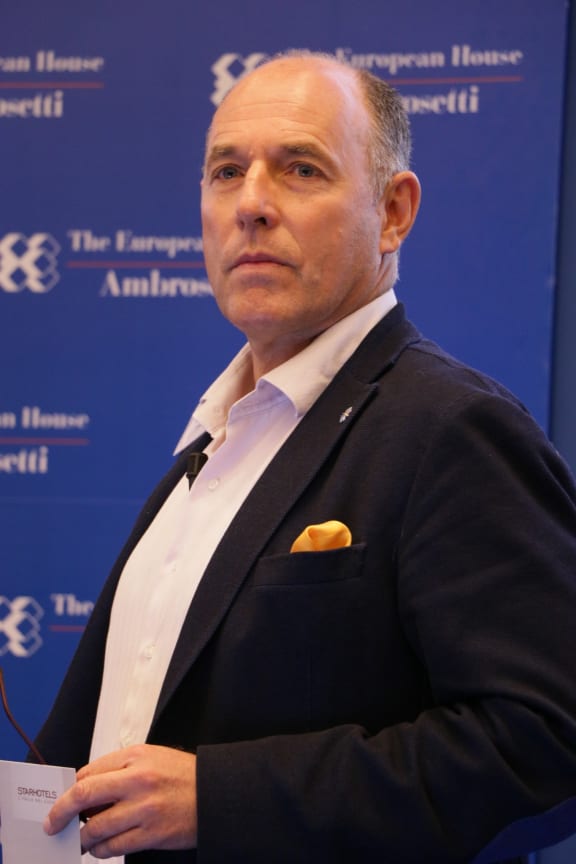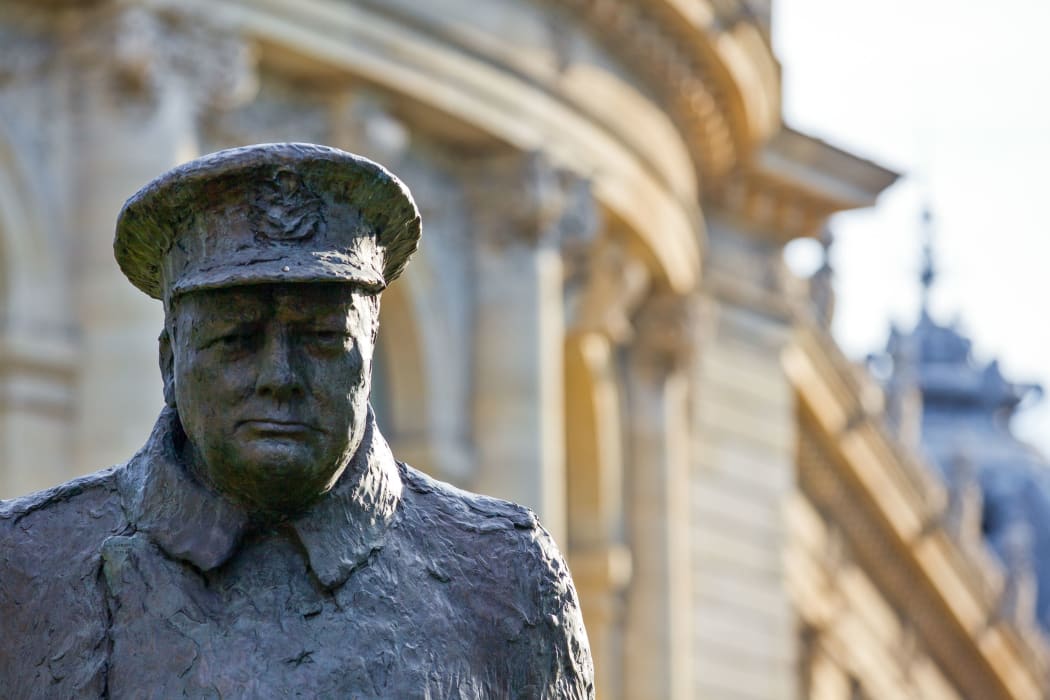Former global HR vice president for Unilever Geoff McDonald, who has himself struggled with anxiety, rolled out a programme there to destigmatise mental illness and boost productivity.

Photo: gstockstudio/123RF
He now campaigns to break down what he says is a negative mental health story in the corporate world.
He's in New Zealand to speak at the Health and Safety Association of New Zealand (HASANZ) conference in Wellington on 6 and 7 September, and tells Kim Hill companies should set employees' health as part of their strategy.
"We're driving efficiency, we're driving costs … so why not say those stresses and strains are actually unsafe from a mental and emotional point of view?"
McDonald says he's put Unilever through a full programme of cultural change aimed at normalising conversations about mental health - and it's having an impact.
"Just like I wouldn't put you at the top of a crane without safety resources around you to keep you safe … let's put those resources around people in the workplace to help them to maintain positive mental and emotional health."

Geoff McDonald Photo: Supplied
"I see a lot of well being programmes in organisations and they're all tick-box exercises, you have this well being week where for one week of the year we have all this care that we show these people … and then the other 51 weeks of the year we flog you to death."
He speaks from personal experience.
"When I was really sick I had no energy ... I had all the skills, all the behaviours, all the knowledge to do my job but I had no energy.
"Midnight 2008, I wake up with a huge panic attack, think I'm having a heart attack. I've never had a panic attack in my life before, probably never even used the words panic attack.
"My wife says 'why don't you go and see a doctor' because I can't get out of bed the next morning. All I want to do is pull the duvets over my head.
"I thought 'why must I go to a doctor', you know? I haven't got any aches and pains, I don't feel nauseous, I've got no temperature.
"[The doctor] asks me a whole bunch about my weight, my sleep patterns, my levels of confidence, my ability to socialise … he asks me have I had any suicidal thoughts and I say 'yes I have', he then turns to me and says 'you're ill'.
"I say 'what am I ill with, you haven't even taken my temperature, you haven't used a stethoscope to listen to my chest,' ... and he says 'you're suffering from anxiety-fuelled depression'.
Decision to not be burdened by stigma
He says he was very lucky to be in a position where he could be open about his illness with his employer.
"I was doing a very, very senior job in HR with Unilever, so I was doing a global role looking at all our personal care categories.
"I'd had close to 20-odd years working for Unilever, I had lots of credibility, a boss who I was really lucky who understood, I'd built a relationship with this individual.

The man's GP believed he was getting counselling for his depression. Photo: 123RF
"And so for me I was able to tell my employer exactly what was wrong with me.
"When I left the doctor's rooms after being diagnosed with anxiety-fuelled depression I made a decision that I would not be burdened by the stigma.
"I would tell my family, I would tell my friends, and I would tell my employer. And ... that decision saved my life."
He says that stigma does exist for the most part, and employees are penalised for being unwell in a way they would not be for other illnesses.
"If I had glandular fever I would be really ill, I wouldn't be able to be at work, and you'd get a lot of sympathy and support to get better.
"I wouldn't want a surgeon operating on me if they had glandular fever. I wouldn't want a pilot flying an aircraft if they were sick with glandular fever."
Eight-fold increase in people asking for help
Mr McDonald says it was a friend's death by suicide that spurred him to enact change at Unilever.

Mr McDonald says employees who are afflicted by mental illness face a different stigma than those who become physically ill, and for that reason and others are less likely to seek help. Photo: melpomen/123RF
He says the effects have been dramatic.
"Absenteeism linked to depression and anxiety has gone down, degrees of presenteeism, employee engagement around those particular areas, attractiveness as an employer.
"After about a year of the rollout of that initiative, just in the area that I was sponsoring which was the head office in London, we saw an eight-fold increase of people putting their hand up and asking for help."
"I say to them, 'part of the success of this is that you are going to see the reality of what is going on in your organisation'."
He says the strategy focused on two things.
"Number one, whether you've got leaders who are prepared to advocated and engage in the change.
"You've also got to change some systems, some processes and policies, because it's often systems, processes and policies that drive behaviour more than leadership role modelling."
Mr McDonald says he set out to change things where he worked.
"In the long term I'm all about prevention, I'm all about trying to get a message out there - why can't we start creating workplaces where we try and maintain the health of our employees.
"Over the years we have spent billions in health and safety. Well, guess what, it's all gone to safety."

Part of improving employees' mental health is in ensuring the organisation as a whole knows what the symptoms are for mental illness, and knows how to manage it logistically. Photo: 123RF
Step 1: Outside influence
Unilever started by getting Alistair Campbell - who was Tony Blair's campaign director before becoming communications director for the UK Labour Party - to come and speak.
Campbell has been outspoken about his struggles with alcoholism and depression.
Step 2: Leadership
McDonald says the next step was to encourage more leaders within the organisation to tell their stories.
"We've all got a story, we've all got a friend, a mother, a father, we've got a son, we've got a daughter, but we've all got a story about mental ill health.
Step 3: Education
The next ingredient was bringing in some knowledge on how to maintain good mental health, and how to spot symptoms if it began to take a turn - in yourself or coworkers.
"Just like we've done in safety for years, you can't go into an organisation today and not get some kind of safety course."
He advocates courses to help people improve sleep, nutrition learn the importance of recovery.

Athletes recover and maintain physical fitness, so why don't employees recover to maintain their mental and emotional fitness and keep at the peak of their abilities? Photo: ocusfocus/123RF
"One of the things athletes do so well, is they know how to recover but they also know how to train hard, well guess what: in business we don't know how to recover, and when you think of recovering everyone thinks that you're slacking off."
Step 4: Support and a sense of purpose
"The last thing that we did was we made sure that we had the support resources in place for people who might be suffering and who needed help and support," he says.
"Finally, has your organisation got a sense of purpose, because that's a big driver of your wellbeing and your health."
It's not just down to the organisation, he says, and employees also need to be able to step up to support themselves.
"We should also be saying to individuals 'you know what, your wellbeing and therefore your energy is a critical driver of your performance and we expect you to maintain that and we will provide resources to help you to maintain that'.
Success: 'A far better human being'
Mr McDonald says he thinks the success of the programme shows improving the culture on mental health at an organisation makes for better employees, and better people.

Photo: giuseppemasci/123RF
"If I had two people of equal stature and somebody declared to me that they had suffered from depression, anxiety in the past but they're now well, they're okay … why would I choose that person versus the robust person?
"I would first of all challenge that that robust character has never had an anxious day in their lives.
"I think that person who's gone through that significant challenge of getting well after suffering from depression, anxiety, displays to me somebody who can overcome some significant challenges in their life.
"I think that person would be far more caring and empathetic as a leader, I think that person would be a far better listener as a leader. I think that person would be a far better human being than some of these narcissistic 'robust' leaders that we have in the world.
"I'm in some amazing company being somebody who has suffered from depression and anxiety: Winston Churchill, Abraham Lincoln, Marie Curie … yet this narrative around mental health is just so negative."
Geoff McDonald has provided support to the Royal Foundation's mental health campaign; was recently appointed a trustee of Family Links (a charity promoting emotional wellbeing), and he is a trustee of It's a Penalty ( a global campaign against the exploitation of children).
He is speaking at the Health and Safety Association of New Zealand (HASANZ) conference in Wellington on September 6-7.
Where to get help:
Need to Talk? Free call or text 1737 any time to speak to a trained counsellor, for any reason.
Lifeline: 0800 543 354 or text HELP to 4357
Suicide Crisis Helpline: 0508 828 865 / 0508 TAUTOKO (24/7). This is a service for people who may be thinking about suicide, or those who are concerned about family or friends.
Depression Helpline: 0800 111 757 (24/7)
Samaritans: 0800 726 666 (24/7)
Youthline: 0800 376 633 (24/7) or free text 234 (8am-12am), or email talk@youthline.co.nz
What's Up: online chat (7pm-10pm) or 0800 WHATSUP / 0800 9428 787 children's helpline (1pm-10pm weekdays, 3pm-10pm weekends)
Kidsline (ages 5-18): 0800 543 754 (24/7)
Rural Support Trust Helpline: 0800 787 254
Healthline: 0800 611 116
Rainbow Youth: (09) 376 4155
If it is an emergency and you feel like you or someone else is at risk, call 111.

